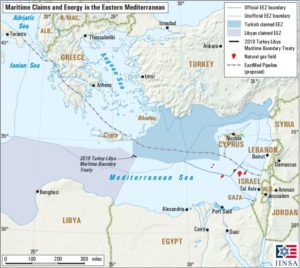Turkey’s Escalation in Libya: Implications and U.S. Policy Options
Turkey’s recent intervention in Libya’s civil war has intensified the involvement of rival foreign powers in the strategically situated, energy-rich country, and threatens vital U.S. interests in the region, even as Washington mostly observes from the sidelines.

Ankara became significantly more involved in Libya in November 2019, when it agreed to provide military support for Tripoli-based, U.N.-recognized Government of National Accord (GNA) – strongly influenced by the Muslim Brotherhood and other Islamist elements – against the rival Tobruk-based Libyan National Army (LNA) supported by UAE, Egypt, Russia, France and others. In exchange, Turkey secured a bilateral pact ostensibly legitimizing its vast offshore territorial claims in the increasingly energy-rich Eastern Mediterranean.
Turkey’s new presence in Libya is emboldening both sides of the conflict to ratchet up their fighting, seek greater foreign assistance and forswear negotiations, despite a U.N. arms embargo and despite coronavirus sweeping through the country. It also directly imperils U.S. interests in promoting peaceful regional energy development.
Yet, even as the Eastern Mediterranean becomes a cauldron of security and energy competition akin to the South China Sea, America remains detached from Libya in particular and the region in general. Indeed, it is perhaps fitting that “leading from behind” was first voiced in the context of Libya under President Obama.
Now is the time for the United States finally to assume a much-needed and long overdue leadership role in ending or mitigating the spiraling proxy conflict in Libya. The United States should enhance its naval presence in the region writ large – including through stronger U.S. defense cooperation with Greece – and appoint a Special Envoy for the Eastern Mediterranean to devise a negotiated solution to the Libya conflict and address related security concerns, including Turkey’s destabilizing projection of power in the region.
Click here to read the report.
Eastern Mediterranean Policy Project Co-Chairs
Amb. Eric Edelman
Former Under Secretary of Defense for Policy
Gen Charles “Chuck” Wald, USAF (ret.)
Former Deputy Commander of U.S. European Command
Eastern Mediterranean Policy Project Members
Gen Philip M. Breedlove, USAF (ret.)
Former NATO Supreme Allied Commander and former Commander of U.S. European Command
Gen Kevin P. Chilton, USAF (ret.)
Former Commander, U.S. Strategic Command
Svante E. Cornell
Policy Advisor, JINSA Gemunder Center for Defense & Strategy
ADM Kirkland H. Donald, USN (ret.)
Former Director, Naval Nuclear Propulsion Program
VADM Mark Fox, USN (ret.)
Former Deputy Commander, U.S. Central Command
ADM Bill Gortney, USN (ret.)
Former Commander, North American Aerospace Defense Command (NORAD)
John Hannah
Former Assistant for National Security Affairs to the Vice President; JINSA Gemunder Center Senior Advisor
Reuben Jeffery
Former Under Secretary of State for Economic, Business and Agricultural Affairs
Alan Makovsky
Former Senior Professional Staff Member at U.S. House Foreign Relations Committee
GEN David Rodriguez, USA (ret.)
Former Commander, U.S. Africa Command
Lt Gen Thomas “Tom” Trask, USAF (ret.)
Former Vice Commander, U.S. Special Operations Command
This report is made possible by the generous support of the Gettler Family Foundation. A portion of the research for this report was conducted on JINSA’s 2019 Benjamin Gettler International Policy Trip to Greece.
Click here to learn more about JINSA’s Benjamin Gettler Annual Policy Trip.